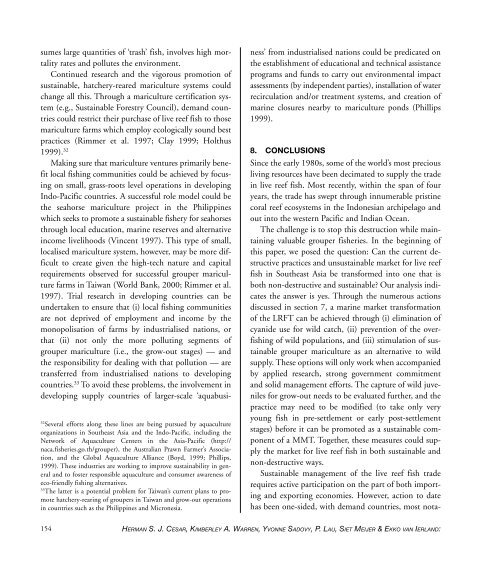You also want an ePaper? Increase the reach of your titles
YUMPU automatically turns print PDFs into web optimized ePapers that Google loves.
32<br />
Several efforts along these lines are being pursued by aquaculture<br />
organizations in Southeast Asia and the Indo-Pacific, including the<br />
Network <strong>of</strong> Aquaculture Centers in the Asia-Pacific (http://<br />
naca.fisheries.go.th/grouper), the Australian Prawn Farmer’s Association,<br />
and the Global Aquaculture Alliance (Boyd, 1999; Phillips,<br />
1999). These industries are working to improve sustainability in general<br />
and to foster responsible aquaculture and consumer awareness <strong>of</strong><br />
eco-friendly fishing alternatives.<br />
33<br />
The latter is a potential problem for Taiwan’s current plans to promote<br />
hatchery-rearing <strong>of</strong> groupers in Taiwan and grow-out operations<br />
in countries such as the Philippines and Micronesia.<br />
sumes large quantities <strong>of</strong> ‘trash’ fish, involves high mortality<br />
rates and pollutes the environment.<br />
Continued research and the vigorous promotion <strong>of</strong><br />
sustainable, hatchery-reared mariculture systems could<br />
change all this. Through a mariculture certification system<br />
(e.g., Sustainable Forestry Council), demand countries<br />
could restrict their purchase <strong>of</strong> live reef fish to those<br />
mariculture farms which employ ecologically sound best<br />
practices (Rimmer et al. 1997; Clay 1999; Holthus<br />
1999). 32<br />
Making sure that mariculture ventures primarily benefit<br />
local fishing communities could be achieved by focusing<br />
on small, grass-roots level operations in developing<br />
Indo-Pacific countries. A successful role model could be<br />
the seahorse mariculture project in the Philippines<br />
which seeks to promote a sustainable fishery for seahorses<br />
through local education, marine reserves and alternative<br />
income livelihoods (Vincent 1997). This type <strong>of</strong> small,<br />
localised mariculture system, however, may be more difficult<br />
to create given the high-tech nature and capital<br />
requirements observed for successful grouper mariculture<br />
farms in Taiwan (World Bank, 2000; Rimmer et al.<br />
1997). Trial research in developing countries can be<br />
undertaken to ensure that (i) local fishing communities<br />
are not deprived <strong>of</strong> employment and income by the<br />
monopolisation <strong>of</strong> farms by industrialised nations, or<br />
that (ii) not only the more polluting segments <strong>of</strong><br />
grouper mariculture (i.e., the grow-out stages) — and<br />
the responsibility for dealing with that pollution — are<br />
transferred from industrialised nations to developing<br />
countries. 33 To avoid these problems, the involvement in<br />
developing supply countries <strong>of</strong> larger-scale ‘aquabusiness’<br />
from industrialised nations could be predicated on<br />
the establishment <strong>of</strong> educational and technical assistance<br />
programs and funds to carry out environmental impact<br />
assessments (by independent parties), installation <strong>of</strong> water<br />
recirculation and/or treatment systems, and creation <strong>of</strong><br />
marine closures nearby to mariculture ponds (Phillips<br />
1999).<br />
8. CONCLUSIONS<br />
Since the early 1980s, some <strong>of</strong> the world’s most precious<br />
living resources have been decimated to supply the trade<br />
in live reef fish. Most recently, within the span <strong>of</strong> four<br />
years, the trade has swept through innumerable pristine<br />
coral reef ecosystems in the Indonesian archipelago and<br />
out into the western Pacific and Indian Ocean.<br />
The challenge is to stop this destruction while maintaining<br />
valuable grouper fisheries. In the beginning <strong>of</strong><br />
this paper, we posed the question: Can the current destructive<br />
practices and unsustainable market for live reef<br />
fish in Southeast Asia be transformed into one that is<br />
both non-destructive and sustainable Our analysis indicates<br />
the answer is yes. Through the numerous actions<br />
discussed in section 7, a marine market transformation<br />
<strong>of</strong> the LRFT can be achieved through (i) elimination <strong>of</strong><br />
cyanide use for wild catch, (ii) prevention <strong>of</strong> the overfishing<br />
<strong>of</strong> wild populations, and (iii) stimulation <strong>of</strong> sustainable<br />
grouper mariculture as an alternative to wild<br />
supply. These options will only work when accompanied<br />
by applied research, strong government commitment<br />
and solid management efforts. The capture <strong>of</strong> wild juveniles<br />
for grow-out needs to be evaluated further, and the<br />
practice may need to be modified (to take only very<br />
young fish in pre-settlement or early post-settlement<br />
stages) before it can be promoted as a sustainable component<br />
<strong>of</strong> a MMT. Together, these measures could supply<br />
the market for live reef fish in both sustainable and<br />
non-destructive ways.<br />
Sustainable management <strong>of</strong> the live reef fish trade<br />
requires active participation on the part <strong>of</strong> both importing<br />
and exporting economies. However, action to date<br />
has been one-sided, with demand countries, most nota-<br />
154<br />
HERMAN S. J. CESAR, KIMBERLEY A. WARREN, YVONNE SADOVY, P. LAU, SIET MEIJER & EKKO VAN IERLAND:


















